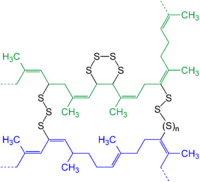
Balancing hydrophobicity and sequence pattern to influence self‐assembly of amphipathic peptides
Sign Up to like & getrecommendations! Published in 2018 at "Peptide Science"
DOI: 10.1002/bip.23099
Abstract: Amphipathic peptides with alternating polar and nonpolar amino acid sequences efficiently self‐assemble into functional β‐sheet fibrils as long as the nonpolar residues have sufficient hydrophobicity. For example, the Ac‐(FKFE)2‐NH2 peptide rapidly self‐assembles into β‐sheet bilayer… read more here.
Keywords: self assembly; hydrophobicity; phe; amphipathic peptides ... See more keywords

Incorporating a Monofluoroalkene into the Backbones of Short Peptides: Evaluating the Impact on Local Hydrophobicity
Sign Up to like & getrecommendations! Published in 2019 at "ChemBioChem"
DOI: 10.1002/cbic.201900082
Abstract: The local hydrophobicity of an amino acid residue in a peptide sequence can be determined by measuring the hydrophobicity index (φ0) by reversed‐phase (RP) HPLC. Herein, the impact on the local hydrophobicity of the replacement… read more here.
Keywords: monofluoroalkene backbones; impact local; short peptides; incorporating monofluoroalkene ... See more keywords

Evaluation of hydrophobic‐interaction chromatography resins for purification of antibody‐drug conjugates using a mimetic model with adjustable hydrophobicity
Sign Up to like & getrecommendations! Published in 2020 at "Journal of Separation Science"
DOI: 10.1002/jssc.201900895
Abstract: Abstract Antibody drug conjugates are cytotoxic pharmaceuticals, designed to destroy malignant cells. A cytotoxic molecule is attached to an antibody that binds specific to a cancer‐cell surface. Given the high toxicity of the drugs, strict… read more here.
Keywords: drug conjugates; hydrophobic interaction; antibody; antibody drug ... See more keywords

Prediction of peptides retention behavior in reversed‐phase liquid chromatography based on their hydrophobicity
Sign Up to like & getrecommendations! Published in 2022 at "Journal of Separation Science"
DOI: 10.1002/jssc.202200743
Abstract: Hydrophobicity is an important physicochemical property of peptides and proteins. It is responsible for their conformational changes, stability, as well as various chemical intramolecular and intermolecular interactions. Enormous efforts have been invested to study the… read more here.
Keywords: liquid chromatography; hydrophobicity; phase liquid; reversed phase ... See more keywords

Fluorination/Torrefaction Combination to Further Improve the Hydrophobicity of Wood
Sign Up to like & getrecommendations! Published in 2019 at "Macromolecular Chemistry and Physics"
DOI: 10.1002/macp.201900041
Abstract: Following recent works on gas/solid fluorination applied to massive wood that sustainably increased its hydrophobicity thanks to the substitution of -OH groups by covalent fluorine atoms, the present paper demonstrates that torrefaction may replace the… read more here.
Keywords: fluorination torrefaction; torrefaction; wood; hydrophobicity ... See more keywords

Antifogging Surface Facilitated by Nanoscale Coatings with Controllable Hydrophobicity and Cross-Linking Density
Sign Up to like & getrecommendations! Published in 2017 at "Macromolecular Materials and Engineering"
DOI: 10.1002/mame.201600199
Abstract: Antifogging and frost-resistant coatings can be used in a wide range of applications and enable high light transmission through substrates even under changes in environmental conditions. In this study, surface confined and cross-linked antifogging thin… read more here.
Keywords: linking density; surface; cross; cross linking ... See more keywords

Exploring hydrophobicity limits of polyproline helix with oligomeric octahydroindole‐2‐carboxylic acid
Sign Up to like & getrecommendations! Published in 2018 at "Journal of Peptide Science"
DOI: 10.1002/psc.3076
Abstract: The polyproline‐II helix is the most extended naturally occurring helical structure and is widely present in polar, exposed stretches and “unstructured” denatured regions of polypeptides. Can it be hydrophobic? In this study, we address this… read more here.
Keywords: octahydroindole carboxylic; hydrophobicity; carboxylic acid; polyproline helix ... See more keywords

A simplified synthesis of silica Colloids with tunable hydrophobicity
Sign Up to like & getrecommendations! Published in 2017 at "Colloid and Polymer Science"
DOI: 10.1007/s00396-017-4079-8
Abstract: Colloidal silica nanoparticles with average diameters less than 100 nm were made using a modified Stöber method involving tetraethylorthosilicate (TEOS) and octadecyl trimethoxysilane (OTMOS) as a surface modifier. We show that the hydrophobicity of the nanoparticles… read more here.
Keywords: simplified synthesis; silica; synthesis silica; colloids tunable ... See more keywords

Fabrication of environmentally-benign flame retardant cotton fabrics with hydrophobicity by a facile chemical modification
Sign Up to like & getrecommendations! Published in 2019 at "Cellulose"
DOI: 10.1007/s10570-019-02431-y
Abstract: Environmentally-benign flame retardant cotton fabrics with hydrophobicity were fabricated using the bio-based flame retardant of phytic acid and n-Dodecyltrimethoxysilane successively, and then morphological structures, combustion behavior, thermal stability as well as hydrophobicity of cotton fabrics… read more here.
Keywords: flame retardant; flame; environmentally benign; hydrophobicity ... See more keywords

Hydrophobicity, rather than secondary structure, is essential for the SRP dependent targeting of GPR35 to the ER membrane
Sign Up to like & getrecommendations! Published in 2019 at "Journal of Bioenergetics and Biomembranes"
DOI: 10.1007/s10863-019-9785-0
Abstract: The folding and targeting of hydrophobic transmembrane domains poses a major challenge to the cell. Several membrane proteins have been shown to gain some degree of secondary structure within the ribosome tunnel and to retain… read more here.
Keywords: secondary structure; srp dependent; structure; hydrophobicity ... See more keywords

Konjac glucomannan-based composite films fabricated in the presence of carnauba wax emulsion: hydrophobicity, mechanical and microstructural properties evaluation
Sign Up to like & getrecommendations! Published in 2019 at "Journal of Food Science and Technology"
DOI: 10.1007/s13197-019-03932-1
Abstract: Despite the excellent characteristics of carnauba wax (CW), hydrophobicity in particular, its complementary effect on the enhancement of konjac glucomannan (KGM) films remains poorly documented. KGM is a promising food bio-packaging material with excellent film-forming… read more here.
Keywords: konjac glucomannan; hydrophobicity; glucomannan based; carnauba wax ... See more keywords